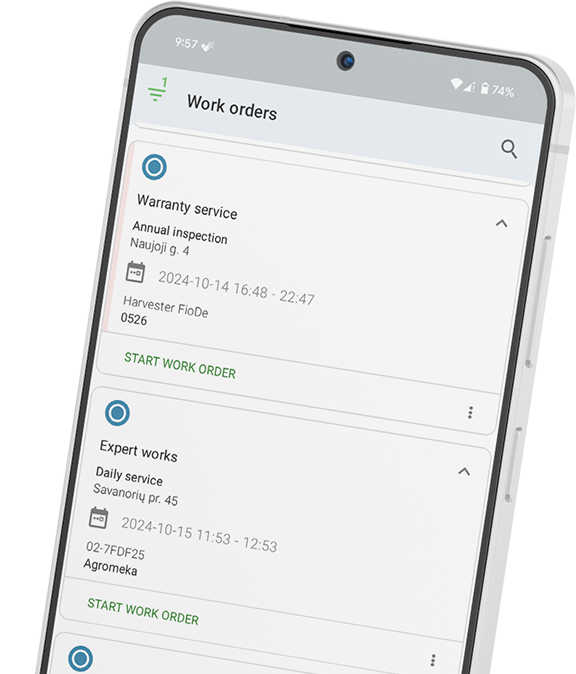Bring simplicity to your field service operations.
Our list of integrations is updated frequently. Explore each integration in its own separate page for more information.
Wheel loaders are highly functional heavy machines, mostly used in construction, landscaping, and other similar. The older, bigger brother to the skid steer loader, the best wheel loaders are structured to withstand heavy workloads under hard working conditions.
In this guide, we will present the maintenance required tips to extend the service life of your wheel loader. Use this knowledge to keep your machines in peak operating condition and maximise work output on the job site.
Wheel loader maintenance intervals depend on working conditions, properly trained drivers, and instructions provided by machine manufacturers. Its driver has to read the operator’s manual and perform daily inspections.
While the wheel loaders and other heavy equipment usually have a long lifespan, the owner that does not follow its maintenance manual and performs regular maintenance procedures will run it to the ground ahead of time.
A wheel loader needs to be serviced when the machine no longer ensures quality performance, but that is hard to determine without frequent maintenance procedures. The best way to avoid problems ahead of time is to plan a wheel loader maintenance schedule:
Regular maintenance procedures include a first formal inspection before the shift, mindful testing of oil and filter components, and post-use inspections at the end of work. For best results, follow the steps in the maintenance manual, and add additional preventive maintenance procedures based on the type of work, its load, and other factors.
Here are the most common procedures for regular wheel loader maintenance.
This category focuses on emergency issues that preventive maintenance procedures fail to detect. These problems surface after a warm-up of the machine, where deeper damages were not visible during formal inspection tasks.
Wheel loader maintenance intervals depend on the workload and type of the machine. A compact wheel loader is lighter and more mobile, but its components may be more susceptible to abrasion in harsher environments.
All-wheel loaders should have daily regular maintenance inspections that test the engine oil, hydraulic oil, air filter, and dust filter health, the effectiveness of brake pads and the overall health of the machine. These quick procedures are usually performed by operators before they start their work. Daily inspections focus less on repairs, and more on cleaning and servicing the machine to keep it in safe operating conditions.
Weekly and monthly maintenance tasks are longer procedures, usually performed by skilled technicians. They thoroughly inspect compact wheel loaders, replace fluids, check engine timing, and clear the vehicle of all internal contaminants for better fuel efficiency.
While maintenance checklists are effective for most heavy machines, optimal compact wheel loader servicing intervals are shown in the wheel loader’s manuals.
A wheel loader owner always knows when to fix the machine thanks to detailed logs in the vehicle’s maintenance history. If all steps in daily, and weekly inspections are documented, technicians can track the signs of gradual failure and fix compact wheel loaders before serious damages affect other components.
Most modern job sites have heavy-duty machines and workers connected under field service management programs. With heavy equipment software tracking the health of the wheel loader and reporting it to the internal network, operators receive timely warnings, and technicians can fix wheel loaders at the best possible time.
If a worn-out wheel loader already exceeds its service life, that does not mean that it is not fit for service. With a faithful dedication to regular maintenance procedures, technicians can greatly extend their lifespan. However, if its most expensive components are pushed to complete failure, it might be a good time to look for a new wheel loader.
Of course, if the rest of the machine is in top condition, buying a replacement might not be your best option. However, here are the main parts that can be too expensive to replace on an old wheel loader:
The best way to save money on maintenance and servicing costs is to stay faithful to your program. With an appropriate plan of inspection and repair procedures, and assistance from heavy equipment software, workers and managers complete control of other maintenance tasks.
By keeping the process honest, fluid, and efficient, operators can take initiative and identify gradual failure, or excessive tear on parts of the machine. Timely informed managers and technicians can take appropriate action to bring the wheel loader into top condition.
Knowing underlying problems ahead of time is the best way to save money for maintenance because managers have more time to buy replacement parts and avoid inflated prices. Daily inspections and heavy equipment maintenance tools help all workers keep a watchful eye on machine health. Preparing for damages in weak spots is the best way to reduce the cost of wheel loader maintenance.
Wheel loaders are important heavy machines that generate great work at construction, mining, and other work sites. Keeping these expensive vehicles in top condition is the best way to keep the work flowing and save money on repair costs.

Our list of integrations is updated frequently. Explore each integration in its own separate page for more information.

Link copied!